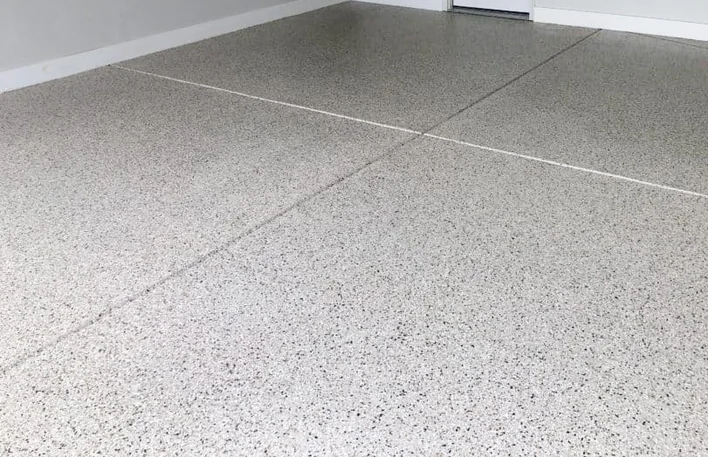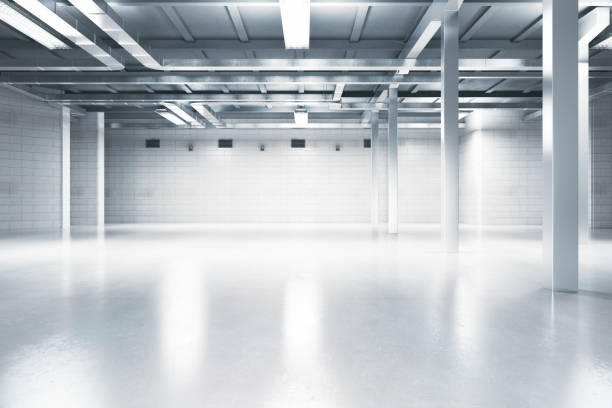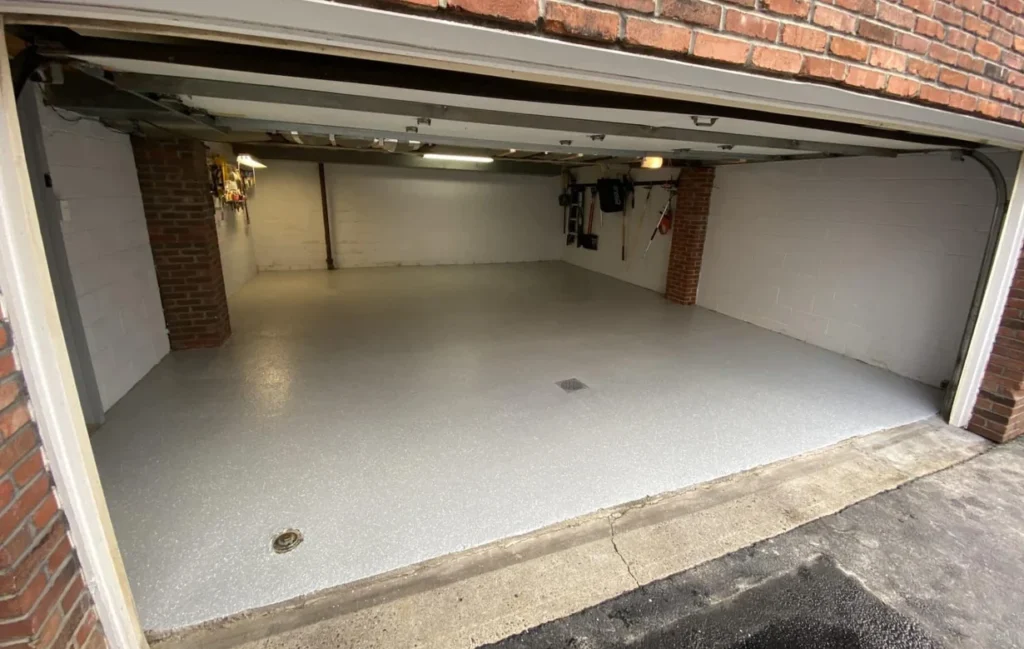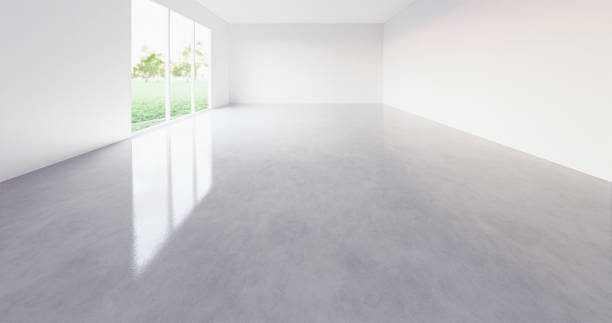
When it comes to flooring options for commercial, retail, and residential spaces, concrete has always been a popular choice due to its durability and cost-effectiveness. However, there are many ways you can upgrade/modify your concrete, some of the most common options being polished concrete and concrete coatings.
At Floor Shield, we coat thousands of floors every year and are often asked, “What is the difference between polished concrete and common types of concrete coatings?” and “Which option is better for my floor?”
Today, we’ll answer both questions and more. We want to be upfront and honest about not only the strengths and weaknesses of the two options but also which one is better for your specific concrete floor.
What is Polished Concrete?
In the process of creating polished concrete, the existing concrete slab is ground down and polished to achieve a smooth and glossy surface. The polishing process involves the use of diamond abrasives and polishing tools of varying grits to gradually refine the surface.
The final appearance and characteristics of the polished concrete depend on factors such as:
- The quality of the original concrete mix
- The degree of grinding and polishing applied.
- Any additional treatments like densifiers and sealers.
Polishing concrete is a multi-step process that involves grinding, honing, and polishing the surface to achieve the desired level of smoothness and shine.
What Are Concrete Coatings?
Concrete coatings refer to various materials that are applied to the surface of concrete to enhance its performance, appearance, and durability. These coatings serve different purposes and can be used in a variety of settings, including residential, commercial, and industrial applications. Here are some common types of concrete coatings:
Epoxy Coatings:
- Composition: Epoxy coatings are a combination of epoxy resin and a hardening agent (curing agent). The two components react chemically to form a rigid, durable surface.
- Curing Time: Epoxy coatings typically have a longer curing time compared to polyurea and polyaspartic coatings. The curing process may take several days.
- Characteristics: Epoxy coatings are known for their high chemical resistance, durability, and strong adhesion to concrete surfaces. They provide a smooth, glossy finish and are commonly used in industrial, commercial, and residential settings.
- Applications: Epoxy coatings are suitable for areas with high traffic, such as garage floors, warehouses, and manufacturing facilities.
Polyurea Coatings:
- Composition: Polyurea coatings are a type of elastomer derived from the reaction of an isocyanate component and a resin blend. They have a faster curing time compared to epoxy.
- Curing Time: Polyurea coatings cure rapidly, often within a matter of hours. This quick curing time allows for faster project completion.
- Characteristics: Polyurea coatings are known for their flexibility, impact resistance, and high chemical resistance. They are suitable for areas that may experience movement or temperature fluctuations.
- Applications: Polyurea coatings are commonly used in industrial and commercial settings, including automotive facilities, manufacturing plants, and areas where a fast return to service is crucial.
Polyaspartic Coatings:
- Composition: Polyaspartic coatings are a type of aliphatic polyurea, and they share similarities with epoxy and polyurea. They are derived from the reaction of an isocyanate component and a resin blend.
- Curing Time: Like polyurea coatings, polyaspartic coatings have a rapid curing time. They can cure within a few hours, allowing for a quicker turnaround.
- Characteristics: Polyaspartic coatings offer high chemical resistance, UV stability, and excellent durability. They are known for maintaining their appearance and color over time, even in outdoor settings.
- Applications: Polyaspartic coatings are suitable for both interior and exterior applications. They are commonly used for garage floors, retail spaces, and outdoor surfaces due to their fast cure times and UV resistance

Polishing concrete is a common choice for large commercial and retail spaces due to its cost-effectiveness and durability. One significant advantage is its relatively low cost for large projects, making it an attractive option for expansive areas.
A major reason you see polished concrete in commercial/retail spaces way more than residential is because of the quality of the concrete. Typically, concrete in homes is:
Of lesser quality
Has bigger pores
is softer than commercial concrete.
This makes it more essential to protect your residential concrete with a covering that will truly protect it. Polished concrete, while having the ability to keep moisture out, does not protect well against abrasion, chemicals, cracks, and other wear and tear. While it may seem contradictory to get a floor covering option that doesn’t protect well in high-traffic environments, commercial settings generally have higher quality concrete that has smaller pores and is harder/stronger, with higher tensile and compression strength. This makes the concrete less likely to get damaged without a protective coating.
Moreover, the aesthetics of polished concrete are limited, lacking customizable color options. This makes it less appealing for residential use, where homeowners often seek a more personalized and visually diverse flooring solution.
Maintenance is another consideration. Depending on the level of foot traffic, polished concrete requires regular repolishing. Usually, this means repolishing every couple of years. Neglecting regular cleaning can lead to a loss of sheen and water-repellent properties. Despite the regular upkeep, many businesses still opt for polished concrete because it is easier and less expensive to repolish than to recoat a section of concrete.
For example, Jackson, our head of technical support at Floor Shield, used to work at a big box retailer that had polished concrete floors. Their store was the highest volume franchise in their district, and one of the highest in their region. So, they had a lot of people coming in and out of their location every day. They had to repolish once every two years.
While you may need to re-coat some spots now and then, most concrete coatings will last you at least a few years before you have to do any maintenance on them. This will vary depending on the level of foot traffic your floor receives

Concrete Coatings: Versatile, Durable, and Aesthetically Pleasing
Concrete coatings offer a versatile solution with various options such as epoxy, polyurea, and polyaspartic coatings. Unlike polished concrete, coatings provide a protective layer that enhances the concrete’s performance and appearance. Here are some key advantages of concrete coatings:
- Protection Against Moisture and Chemicals
While polished concrete repels liquids, it doesn’t provide adequate protection against chemicals. Certain substances can even eat through the polish and wax, causing damage to the polish and concrete. Concrete coatings, on the other hand, create a barrier between the surface and the underlying concrete, offering effective protection against moisture, chemicals, and abrasion.
- Aesthetic Variety
Polished concrete has a limited aesthetic appeal, resembling shiny concrete without customizable color options. Concrete coatings, however, provide a wide range of choices. Depending on the provider, homeowners can opt for many options. At Floor Shield, we offer:
- Any custom color or color combination of your choosing
- Colored flakes (including glow-in-the-dark options)
- Matte or glossy finishes.
- Extended Lifespan
Polished concrete may need re-polishing every few years, depending on traffic volume. In contrast, durable concrete coatings like polyaspartic can last for several years without requiring significant maintenance. At Floor Shield, our 100% polyaspartic concrete coating is warranted to last for 15 years. Additionally, it isn’t prorated, meaning we warrant the whole cost of our product for all 15 years. Our warranty coverage does not diminish over time.
Conclusion: Making the Right Choice for Your Space
The choice between polished concrete and concrete coatings depends on the specific needs and characteristics of the space in question. Polished concrete is a cost-effective solution that’s great for large commercial spaces with high-quality concrete, while concrete coatings offer versatility, durability, and aesthetic variety more suitable for residential settings with lower-quality concrete.
If you’re interested in getting a free quote for a concrete coating from us at Floor Shield, fill out the form below.



